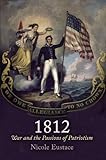1812 : War and the Passions of Patriotism / Nicole Eustace.
Material type: TextSeries: Early American StudiesPublisher: Philadelphia : University of Pennsylvania Press, [2012]Copyright date: ©2012Description: 1 online resource (336 p.) : 19 illusContent type:
TextSeries: Early American StudiesPublisher: Philadelphia : University of Pennsylvania Press, [2012]Copyright date: ©2012Description: 1 online resource (336 p.) : 19 illusContent type: - 9780812244311
- 9780812206364
- Emotions -- Social aspects -- History -- 19th century
- Emotions -- Social aspects
- Emotions -- Social aspects -- History -- 19th century
- HISTORY -- Modern -- 19th century
- Patriotism -- United States -- History -- 19th century
- Patriotism -- United States -- History -- 19th century
- American Studies
- HISTORY / Modern / 19th Century
- American History
- American Studies
- 973.521
- E354 ǂb E97 2012eb
- online - DeGruyter
- Issued also in print.
| Item type | Current library | Call number | URL | Status | Notes | Barcode | |
|---|---|---|---|---|---|---|---|
 eBook
eBook
|
Biblioteca "Angelicum" Pont. Univ. S.Tommaso d'Aquino Nuvola online | online - DeGruyter (Browse shelf(Opens below)) | Online access | Not for loan (Accesso limitato) | Accesso per gli utenti autorizzati / Access for authorized users | (dgr)9780812206364 |
Browsing Biblioteca "Angelicum" Pont. Univ. S.Tommaso d'Aquino shelves, Shelving location: Nuvola online Close shelf browser (Hides shelf browser)

|

|

|

|

|

|

|
||
| online - DeGruyter In the Shadow of the Gallows : Race, Crime, and American Civic Identity / | online - DeGruyter The Camera and the Press : American Visual and Print Culture in the Age of the Daguerreotype / | online - DeGruyter Healing Secular Life : Loss and Devotion in Modern Turkey / | online - DeGruyter 1812 : War and the Passions of Patriotism / | online - DeGruyter Laboring Women : Reproduction and Gender in New World Slavery / | online - DeGruyter Reconciliation in Divided Societies : Finding Common Ground / | online - DeGruyter The Way of Improvement Leads Home : Philip Vickers Fithian and the Rural Enlightenment in Early America / |
Frontmatter -- Contents -- Preface Emotion, Persuasion, and the Meaning of War -- Chapter 1. Celebrating Love, Liberty, and Progeny United States, circa 1811 -- Chapter 2. Failures of Feeling as National Disasters Detroit, August 1812 -- Chapter 3. Romantic Stories of Republican Conquest on the Great Lakes lake Erie, September 1813 -- Chapter 4. Demographic Strategies and the Defeat of Tecumseh Moraviantown, Canada, October 1813 -- Chapter 5 Liberty, Slavery, and the Burning of the Capital Washington, d.c., August 1814 -- Conclusion Ardor and Triumph new Orleans, January 1815 -- Notes -- Index -- Acknowledgments
restricted access online access with authorization star
http://purl.org/coar/access_right/c_16ec
As military campaigns go, the War of 1812 was a disaster. By the time it ended in 1815, Washington, D.C., had been burned to the ground, the national debt had nearly tripled, and territorial gains were negligible. Yet the war gained so much popular support that it ushered in what is known as the "era of good feelings," a period of relative partisan harmony and strengthened national identity. Historian Nicole Eustace's cultural history of the war tells the story of how an expensive, unproductive campaign won over a young nation-largely by appealing to the heart.1812 looks at the way each major event of the war became an opportunity to capture the American imagination: from the first attempt at invading Canada, intended as the grand opening of the war; to the battle of Lake Erie, where Oliver Perry hoisted the flag famously inscribed with "Don't Give Up the Ship"; to the burning of the Capitol by the British. Presidential speeches and political cartoons, tavern songs and treatises appealed to the emotions, painting war as an adventure that could expand the land and improve opportunities for American families. The general population, mostly shielded from the worst elements of the war, could imagine themselves participants in a great national movement without much sacrifice. Bolstered with compelling images of heroic fighting men and the loyal women who bore children for the nation, war supporters played on romantic notions of familial love to espouse population expansion and territorial aggression while maintaining limitations on citizenship. 1812 demonstrates the significance of this conflict in American history: the war that inspired "The Star-Spangled Banner" laid the groundwork for a patriotism that still reverberates today.
Issued also in print.
Mode of access: Internet via World Wide Web.
In English.
Description based on online resource; title from PDF title page (publisher's Web site, viewed 24. Apr 2022)


